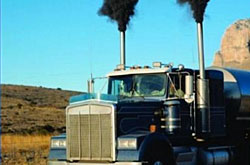|
How Was Viscon Developed?
Viscon technology originated in a research program for the Department of Defense. The objective was to develop compounds that reduce explosion hazards with jet fuel. Further investigation revealed Viscon greatly improved combustion and reduced engine temperatures.
What makes Viscon unique?
The Viscon fuel additive is used to improve air/fuel mixture preparation which is normally addressed by engineers modifying engine hardware. Viscon’s technology modifies the fuel’s physical properties, rather than fuel chemistry. The inventors of Viscon discovered that diesel fuel’s physical behavior stands in the way of optimizing air/fuel mixture in diesel engines and devised a way to modify the behavior.
Is Viscon Toxic?
No. The active ingredient of Viscon is a food-grade polymer used in products like chewing gum. It is not miscible in water and will not contaminate our groundwater. Viscon is a pure hydrocarbon and is thus exempt from EPA fuel additive registration.
Is Viscon Expensive?
Total treatment costs should be on the order of pennies per gallon of fuel treated. When you add other positive aspects such as extended engine life, reduced overall maintenance costs and better fuel mileage, the cost of treatment will be substantially reduced.
Will Viscon Improve Mileage?
Ninety-five percent of the vehicles using Viscon improve their mileage. Some temporary reductions may occur while the engine computer adjusts the air/fuel ratio. Since Viscon is a powerful cleaning agent, mileage and performance will continue to improve as deposits are eliminated from the engine.
How does Viscon effect engine timing?
Viscon will widen the tuning tolerance of any engine. Viscon has been demonstrated to allow increased spark advance before knock. Therefore, a small advance in spark can be used to improve mechanical efficiency of your engine.
What is Viscon’s production capacity?
8,085 gallons of Viscon per day. Sufficient to treat 20,697,600 gallons of diesel per day.
Will Viscon improve the cetane/octane rating of fuel?
The octane number of a fuel denotes its ability to resist pre-ignition combustion. Combustion gas temperature has a direct relationship on an engine’s cetane/octane requirement. Viscon reduces combustion gas temperature and reduces the engine’s cetane/octane requirement.
Could Viscon Be Substituted For MTBE?
Small additions of Viscon to the fuel provide considerable additional horsepower and torque while the efficiency of burn improves. It is a far superior alternative to MTBE and it will not contaminate our ground water.
Is Viscon EPA approved?
Viscon is a pure hydrocarbon, and as such is exempt from EPA regulations. In accordance with the EPA registration requirements for fuels and fuel additives, “‘additive’ means any substance other than one composed solely of carbon and/or hydrogen.”
Why does Viscon improve throttle response?
As the throttle is advanced more fuel is delivered to the induction system of an engine. However, there is a lag in getting the additional fuel into the cylinder due to the physical properties of the fuel. This causes a lean condition and poor throttle response. Viscon changes the physical properties of fuel so that more fuel is entrained in the air/fuel mixture entering the cylinder.
Why does my automobile start more easily when I use Viscon?
Cold starts are complicated by the reduced vaporization of fuel in a cold engine. The result is insufficient fuel in the cylinder to support proper combustion. During cold starts, a considerable percentage of fuel wets intake and cylinder walls. By reducing wall wetting through the viscoelastic properties it imparts on fuel, Viscon improves the mixing of fuel with air which in turn improves engine starting.
How does Viscon effect spray patterns?
Viscon reduces the Sauter mean volume diameter of sprayed fuel. It also makes droplet size distribution across an injector spray cone more uniform. Finally, Viscon causes the mass of fuel to be more evenly distributed across the spray cone.
|







